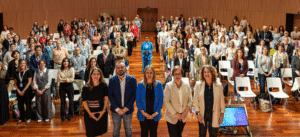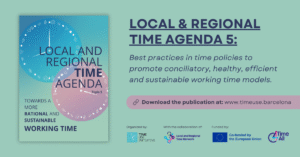On April 20th, a new topic of the Local and Regional Time Agenda was publicly presented. It analysed the relation between time, mobility, and sustainability, and their role in creating resilient urban realities. The publication, coordinated by the Local and Regional Governments TIME Network, compiled more than 30 inspiration cases of policies that are changing urban and rural landscapes. Ultimately, it shows how the Network envisages 21st Century’s cities, metropolises, and regions as places designed not to waste citizen’s time, but that actively works towards saving it.
During the presentation, Gabriela Uchoa, consultant at UN-Habitat’s Global City Resilience Programme and Emmanuel Munch, research officer at the French Ministry for Ecological Transition, held an introductory conversation exploring the relation between time, mobility, and urban resilience. In the publication, such a topic is further explored by a reflection on time and urban life, by Charo Morán, Yayo Herrero and Helena Pariente, from Cooperativa Garúa.
Six inspiring cases explained during the event
The event was facilitated by Caroline Kramer, Human Geographer of Institute of Geography and Geoecology (IFGG) and member of the research group of the Barcelona Time Use Initiative, and it counted with a discussion of inspiring cases. They were aimed at answering three questions, which defined the right to time in relation to sustainability:
- How to deal with the rush hour?
- Lucie Verchère, from Tempo Territorial, presented the cases of the City of Rennes, the European Metropolis of Lille, and the Metropolis of Greater Lyon in relation with coordinating mobility schedules.
- How to create 15-minute cities?
- Ariadna Miquel, Director of Urban Strategy at the Barcelona City Council, presented the case of Barcelona Superblocks and their time indicators.
- Sylvia Profanter, Director of the Office for Time and Statistics at the Municipality of Bolzano, presented the case of nearing public services in Bolzano.
- How to encourage a timely, sustainable mobility outside big cities?
- Christina Karamperi, from the Department of Research and Communications at e-Trikala, S.A and the Municipality of Trikala, presented the case of the SMARTA2 project in relation with connecting Trikala’s city centre and the rural areas.
- Gabriella D’Avanzo, Project Officer at the Metropolitan City of Milan, presented the case of the Cambio project, in relation to creating a bike lane infrastructure connecting the metropolis.
- Josep Mª Fortuny i Olivé, Deputy Director-General for Transport Organisation, presented the case of Exprés.cat as a public transportation service that connects different regions within Catalonia with their capital city.
- How to deal with the rush hour?
The event counted with the presentation of the secretary of the Local and Regional Governments TIME Network, Marta Junqué who explained that “The Network was funded in 2008 and is a unique world-wide network that focus on the implementation of time policies and promoting the right to time, specially at the local and regional level. Currently, the Network includes cities from all over Europe (as Barcelona, Milano, Strasbourg) and it recently started to expand in Latin America. Bogotá, Buenos Aires, andMontevideo are already part of it. The Network has been awarded with funds from the European Union to execute a project, called Time4all, which aims at promoting the right to time around cities and towns and organise exchange events like this.”
The Local and Regional Time Agenda
It is a compilation of time policies implemented by local, metropolitan, and regional authorities from all over the world. Launched in 2022, the Time Agenda first topic analysed the concept of “life balance”, or the relation between working, care, personal, and rest times. After the presented second topic, the Network’s plan is to publish a new topic twice a year, covering other dimensions of the right to time.
“As time policies are a new area of interest for many institutions, the Time Agenda objective is showing clear and real examples of time policies already in place at different levels of competence. Its final aim is showing that the right to time is not just a theoretical concept, but a real right already in place”, stated Junqué.
Further information
- The Local and Regional Time Agenda full publication can be downloaded here.
- Presentations by speakers are available below:
- Bolzano’s 15 minute city.
- Barcelona’s Superblock.
- Catalonia’s Exprés.cat.
- Trikala’s SMARTA2.
- Rennes, Lyon, and Lille, by Tempo Territorial.
- Metropolitan City of Milan’s Cambio.
- The event can be retrieved in English and Catalan. The original video, without translation, is also available.






